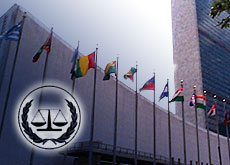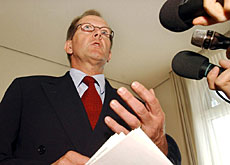A turning point for international justice?

Switzerland is taking part in a week-long meeting in New York which will lay the ground for the International Criminal Court to start operating.
The Swiss have been unwavering in their support for the court, despite pressure from the United States, which wants its citizens exempt from possible prosecution.
The first Assembly of States to the International Criminal Court, which meets from September 3 to 10, will decide how to elect the 18 judges who will sit on the tribunal.
During the meeting at United Nations headquarters, they are also expected to approve the rules and budget for the court, which have already been set out in earlier preparatory sessions.
The court officially came into existence on July 1, and is the first of its kind with the power to try individuals for genocide, crimes against humanity and war crimes committed anywhere in the world.
Powerful opposition
However, questions have been raised over its jurisdiction given that several countries – most notably the US, China, Russia and Israel – have refused to approve or ratify the necessary treaties.
Indeed, the US has actively tried to undermine the court by pressuring countries – including Switzerland – to agree not to deport US citizens to the court. The Swiss, who were founding members of the court, refused saying any such move risked destroying the court’s credibility.
So far 78 countries have ratified the treaty – enough to bring the court into existence.
Journalist and writer Pierre Hazan, author of “Justice confronted by war”, believes the meeting in New York is a turning point.
“It’s a historic meeting and shows that a great leap forward has been made in international justice,” Hazan told swissinfo.
“It’s a important step which should surmount the hostility shown by some of the most powerful states in the world, such as Russia, China or the United States.”
Without the US
However, Hazan says a key question which will preoccupy minds at the New York meeting is whether the international community can continue with the ICC without US backing.
Only hours before the court was due to open, the US vetoed a resolution to extend United Nations peacekeeping operations in Bosnia over concerns its soldiers could be prosecuted by the ICC.
It then tried to pressure countries into exempting US citizens from prosecution, persuading four countries to sign up to a bilateral agreement.
So far, the European Union has refused to budge – along with Norway – but there are divisions among its 15 member states. They are expected to forge a common position by the end of the month.
High-risk meeting
The International Federation for Human Rights (IFHA) says a meeting being held in such a tense atmosphere could damage the future independence of the court.
“The quality of the judges as well as their independence will be essential to how well the court works,” said the IFHA in a statement.
To defend Swiss interests, Bern has appointed ambassador Nicolas Michel, head of the international law section of the foreign ministry, to lead its delegation.
Michel’s boss, foreign minister, Joseph Deiss, will be taking part in the ministerial meeting on September 10, the day when Switzerland officially joins the United Nations.
swissinfo, Frédéric Burnand, translated by Isobel Johnson
1995: Start of preparatory work for the ICC.
July 1998: Rome Conference adopts the ICC statute.
July 2002: ICC comes into force, with 60 countries having ratified the Rome Statute.
September 2002: First meeting of the State Parties of the ICC.
Of the 139 countries which signed the Rome Statute, only 78 have ratified the treaty.
The ICC’s mandate is to prosecute war crimes, crimes against humanity and genocide.

In compliance with the JTI standards
More: SWI swissinfo.ch certified by the Journalism Trust Initiative



You can find an overview of ongoing debates with our journalists here . Please join us!
If you want to start a conversation about a topic raised in this article or want to report factual errors, email us at english@swissinfo.ch.